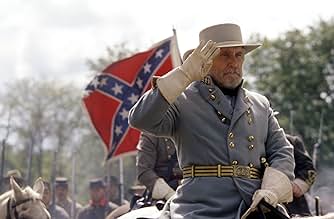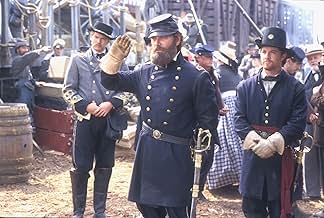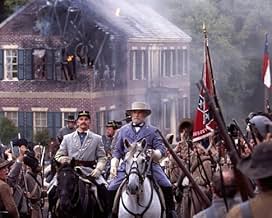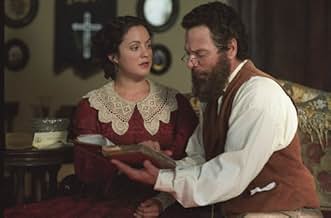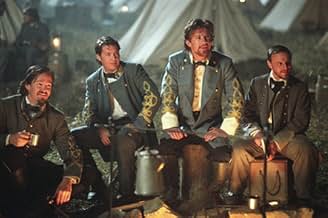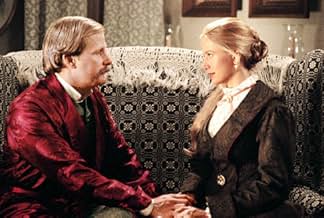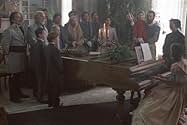A ascensão e queda do general confederado Thomas "Stonewall" Jackson, enquanto ele obtém sucesso militar contra a União de 1861 a 1863, quando é morto acidentalmente por seus próprios soldad... Ler tudoA ascensão e queda do general confederado Thomas "Stonewall" Jackson, enquanto ele obtém sucesso militar contra a União de 1861 a 1863, quando é morto acidentalmente por seus próprios soldados.A ascensão e queda do general confederado Thomas "Stonewall" Jackson, enquanto ele obtém sucesso militar contra a União de 1861 a 1863, quando é morto acidentalmente por seus próprios soldados.
- Prêmios
- 1 vitória e 4 indicações no total
- Gen. James Kemper
- (as Royce Applegate)
- Confederate General
- (as Robert C. Byrd)
- Direção
- Roteiristas
- Elenco e equipe completos
- Produção, bilheteria e muito mais no IMDbPro
Avaliações em destaque
Regarding the lack of political correctness, which in my opinion is our modern version of hypocrisy (we can do anything we want as long as we call it by another name) I would like to point out that this is an attempt at a historical movie and that the Civil War was NOT fought to free the slaves, nor were many people in the North comfortable with the concept of a franchised Negro. And some slaves in the South were relatively well treated by their owners, not that they probably didn't want freedom, but they didn't particularly wish their masters ill. The system was set up so that everyone involved, slaves and masters, had something to lose by destroying the status quo, and that's a very difficult thing for people to do. It's easy for us now to say 'they should have freed the slaves' but if you knew that to free your slaves would beggar your children, would you be able to do it?
As with Gettysburg, the battle scenes were impressive and awe-inspiring. And they made the strategy and tactics clear to the viewer which is a monumental achievement, not to mention showing the pure courage on both sides, going to probably death or dismemberment without flinching. I would have liked more about the Northern command struggles to balance the picture but I can see how tempting it was to show the Southern victories to balance the horrible defeat at Gettysburg -- and this picture is meant to be one of a trilogy. I can only hope that word of mouth defeats the critics and gets this movie the audience it deserves.
I find it interesting how almost no emphasis is put on any commanding Union general in either film, with only about 2 minutes of dialouge between Hancock and Burnside before the disaster at Fredericksberg. It should always be noted that Lee's early victories can be credited equally on the Union commanders utter incompotence as well as Lee's exeptional stratigic ability.
I'm sure "The last full measure" (the final film of the trilogy) will put a fair amount of emphasis on General Grant as he assumes command for the Army of the Potamac in 1864. I just hope we dont have another 10-year interval between films.
They are both great films. They have not been the box-office hits because of their legnth and a lack of hard-core history lovers to pay up at the theatre. I'm sure that "Gods" will be aired on TBS soon in a 2 part "mini-series" format to very good ratings as "Gettysberg" did.
What's very impressive about this movie was (1) not overdone violence; (2) beautiful cinematography; (3) an unusual and refreshing reverence for God, the Bible and Christian thought and (4) a better portrayal by Robert Duvall of Robert E. Lee than Martin Sheen's version in "Gettsyburg." On the point 3, all it was - to those atheists/agnostics who were offended by Jackson's reverence - was showing an accurate portrayal of how people thought and believed back then in the south. That's simply the way it was and the way people viewed everyday life, though Biblical standards and language. So kudos, to the filmmakers here for at least giving us an accurate description of the times, even though they probably don't share those beliefs. Of course, the critics - almost all of them secular - hated the film.
One thing I did miss from "Gettysburg" was a bigger role from Jeff Daniels, who was so good as "Col.Chamberlain." His role here in that capacity is limited.
In summary, an accurate film with ideals and worthy of anyone's collection, particularly if they are Civil War buffs, but a movie that needed more punch to it to be more "watchable."
Yep, that's just what you might believe. If you took history from this film.
Gods and Generals is a confused, heavily pro-Confederate, train wreck. It attempts to span two years of the war though the perspective of General Thomas "Stonewall" Jackson, arguably one of the most brilliant field commanders West Point has ever produced. Like it's antecedent Gettysburg it is of epic length except that Gettysburg actually made sense. This film is all over the place. Focuses on non-pivotal battles and is bloated with nonsensical dialog and close ups of men talking to themselves in archaic,sanctimonious, soliloquies. There are no issues, there are no cassus belli,no internal conflicts, there is only a clumsy even bizarre celebration of the confederacy; depicted as an embattled yet righteous society defending their way of life against their tyrannical northern overlords. There is one mention of Fort Sumter, a passing nod or two to slavery, and the rest is the Lee/Jackson traveling show. Overall a sloppy production which screams lousy direction and lack of focus. I felt the book told the story of Jackson in much more coherent style than this mess.
To it's credit, it does have very graphic and disturbing battle scenes where both sides are, at times, honored and portrayed with equanimity.
However, G&G, like Gettysburg (a MUCH better directed film), had potential to evenly instruct and entertain. That's where the similarities between the two films ends Gods and generals is a ponderous, rambling, confusing, tribute to the CSA. Aside from it's endless length it jumps around way too much, lacks proper character development and historical veracity, which is far too extensive to get into for the purposes of a review. I will say that Stephen Lang was magnificent as Jackson, but I wasn't terribly impressed with Robert Duvall as Lee. It is no wonder it bombed at the box office. It's just not very watchable, at least not in one sitting. It might be of interest to those, like myself, who are interested in civil war films. This one is a grave disappointment.
The reverence shown to Generals Jackson and Lee is usually reserved for biblical figures. It made me wonder if "Gods and Generals" captures the way people of that time really spoke?
Maybe formal address was more common in the 1860's, but just about everything anyone says in the first hour and a half is a speech. Before the brilliantly staged Battle of Fredericksburg, Jeff Daniels even recites an ancient poem, "The Crossing of the Rubicon".
I'm sure the dialogue has been shaped from historic records and especially letters, but people don't necessarily speak the way they write; some of the exchanges between husbands and wives, and mothers and sons in this film are bizarre. The frequent appearances of John Wilkes Booth ever ready with a Shakespearean soliloquy add to the theatricality.
Some may object to a comparison with "Gone with the Wind'. However it has far more natural speech patterns than "Gods and Generals" and in 1939, when it was released, there were still some thousands of veterans of the war still alive, albeit elderly.
Heightening the dolefulness of "Gods and Generals" is the score. Other than source music from bands and soldiers singing, pathos informs nearly every theme whether for an intimate interior or a horizon-wide battle. To be fair, the theme for the surprise attack at Chancellorsville, "VMI Will Be Heard From Today", shows how the rest of the score could have been coloured differently.
Possibly the filmmakers didn't want to glorify war by building the score around the stirring anthems and songs of the Civil War, but it's a classic example of how music can shape the mood of a film.
For a while it seemed that slavery was receiving a pass, but towards the end, Jeff Daniel's Joshua Chamberlain puts it into context.
"Gods and Generals" does too much. Surely John Wilkes could have been saved for another movie. However the look of the film is amazing. We are transported to those battlefields; each one different, although we are spared what a blast of grapeshot would actually do to a human body.
In the end, those authentic looking re-creations of suicidal advances and troops firing point blank volleys into each other can only leave the impression that it was an era that produced remarkably brave soldiers.
Você sabia?
- CuriosidadesSome scenes were filmed on Robert Duvall's estate in Virginia, which was the site of some Civil War skirmishes.
- Erros de gravaçãoRobert Edward Lee and Thomas Jonathan Jackson are shown wearing full beards at the very start of the Civil War, but they did not look like this until sometime later. Lee had dark hair going gray and wore a drooping mustache of the type favored by army officers in the 1850s. He grew his well known beard while serving as Jefferson Davis's military advisor. Jackson was clean shaven and grew a beard later out of his well known disinterest in personal grooming and appearance.
- Citações
Joshua Lawrence Chamberlain: All these thousands of men. Many of them not much more than boys. Each one of them some mother's son, some sister's brother, some daughter's father. Each one of them a whole person loved and cherished in some home far away. Many of them will never return. An army is power. Its entire purpose is to coerce others. This power can not be used carelessly or recklessly. This power can do great harm. We have seen more suffering than any man should ever see, and if there is going to be an end to it, it must be an end that justifies the cost. Now, somewhere out there is the Confederate army. They claim they are fighting for their independence, for their freedom. Now, I can not question their integrity. I believe they are wrong but I can not question it. But I do question a system that defends its own freedom while it denies it to an entire race of men. I will admit it, Tom. War is a scourge, but so is slavery. It is the systematic coercion of one group of men over another. It has been around since the book of Genesis. It exists in every corner of the world, but that is no excuse for us to tolerate it here when we find it right infront of our very eyes in our own country. As God as my witness, there is no one I hold in my heart dearer than you. But if your life, or mine,is part of the price to end this curse and free the Negro, then let God's work be done.
- Cenas durante ou pós-créditosNo reenactors were credited individualy, rather there was general thank you to all the reenactors who participated in the filming.
- Versões alternativasThe Director's Cut of the film includes additional action scenes from the Battle of Antietam. The battle scenes are shown from the perspectives of Jackson and Chamberlain, and mostly focus on the fighting in Miller's Cornfield which was a major deciding point of the battle.
- ConexõesFeatured in Bob Dylan: Cross the Green Mountain (2003)
Principais escolhas
- How long is Gods and Generals?Fornecido pela Alexa
Detalhes
- Data de lançamento
- País de origem
- Idioma
- Também conhecido como
- Gods and Generals
- Locações de filme
- Empresas de produção
- Consulte mais créditos da empresa na IMDbPro
Bilheteria
- Orçamento
- US$ 56.000.000 (estimativa)
- Faturamento bruto nos EUA e Canadá
- US$ 12.882.934
- Fim de semana de estreia nos EUA e Canadá
- US$ 4.675.246
- 23 de fev. de 2003
- Faturamento bruto mundial
- US$ 12.923.936
- Tempo de duração3 horas 39 minutos
- Cor
- Mixagem de som
- Proporção
- 2.39 : 1







